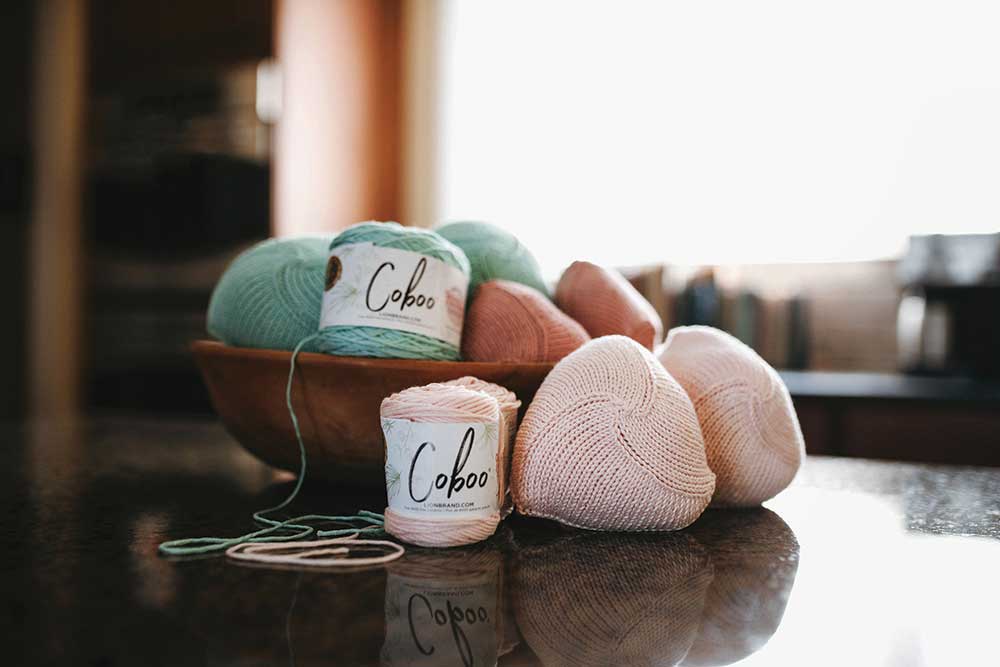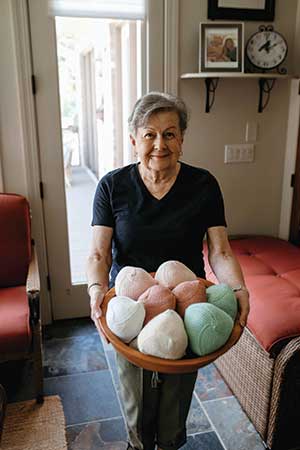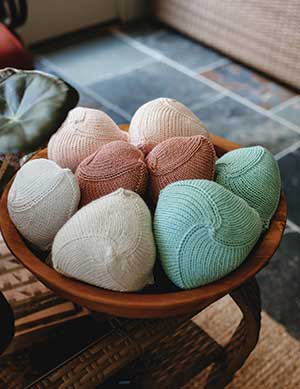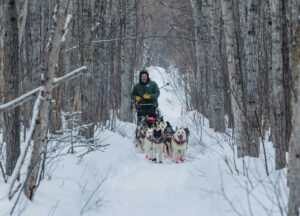
Trudy Mayoros’ knitting gives breast cancer survivors a lift
Story by Elaine Hobson Miller
Photos by Meghan Frondorf
Mentioning “knitted knockers” usually elicits raised eyebrows, sly grins or outright snickers from people who haven’t heard the term before. Among breast cancer survivors who are familiar with the term, it elicits smiles and sighs of relief.
Knitted knockers are soft, comfortable, handmade breast prosthetics for women who have undergone mastectomies or other breast procedures. Unlike traditional prosthetics, knitted versions are lightweight and gentle on scarred or sensitive skin.
Trudy Mayoros has never had breast cancer. But she has been knitting since she was five years old. So, when she learned about the volunteer organization that provides knitted and crocheted alternatives to expensive, heavy breast prosthetics, free of charge, she was touched. She jumped on the bandwagon immediately.
“I’ve been doing this since 2016, when Lee Ann Clark, county extension coordinator for Alabama Cooperative Extension Services for St. Clair, held a big Pink & Teal Awareness luncheon that October and introduced people in this area to Knitted Knockers,” Trudy says. “October is Breast Cancer Awareness Month, and pink is its color. Teal is for ovarian cancer, and Lee Ann’s sister died of ovarian cancer. After the luncheon, some of us formed a Knitted Knockers group.”
Initially, several women met to knit and crochet the knockers, and their inventory grew well beyond the requests received. So, they sent their inventory to Knitted Knockers headquarters in Washington state. “Currently, we knit as we receive orders and usually specifically for the size and color requested,” Trudy says.
Since its inception in 2011, Knitted Knockers has provided 1,876 handmade knockers to registered medical providers (to give to their patients), 447,871 knitted knockers total and has 4,756 groups involved in the knitting, all on a worldwide basis.
Although her monthly numbers vary now because she makes them upon request, Trudy has knitted at least five dozen pairs, as well as singles, over the past five years.She also knits and crochets about half a dozen blankets and 10-15 hats each month for other charity organizations. Topping her list are the Warm Up America Foundation, a Texas-based organization that supplies blankets, hats and scarves to the homeless; Ann’s New Life Center for Women, located in Cropwell and Leeds, which supplies blankets, booties and caps to new mothers; a couple of Native American charities and the Jimmie Hale Mission in downtown Birmingham.
“I love doing this,” she says. “It’s my thing, my mission.”
She has been a knitter since she was five, when she made a pair of socks for her father. “He was thrilled, but I can imagine what they were like,” she says, in a voice as soft as the pima cotton with which she knits the knockers, and that retains a hint of her Swiss accent.
Born in Switzerland, it makes sense that she knits European or continental fashion. In this style, the yarn is held in the left hand and a subtle movement of the left index finger is used to help the needle pick up the yarn and form a new stitch. “American style involves holding the yarn in your right hand and ‘throwing’ it over the needle to form the stitch,” she says. She uses four needles for the knockers, knitting with two, dropping one, then picking up another as she forms the triangular shape. It takes about an hour and a half to knit one knocker.
Most of her orders come from individuals who learn of her service by word of mouth or from their oncologist. When she gets an order, she tries to turn it around in one to two days. “I let them pick the color,” she says. “Beige is the most popular choice, but pink is popular, too. It’s the only time they can pick their size! Believe it or not, most of the time they go smaller (than before surgery).”
Women to whom she has given knockers often send thank-you notes, and sometimes they include a donation. In keeping with the tenets of Knitted Knockers Foundation, she doesn’t charge a cent for her work. If she gets a donation from a grateful wearer, she turns it back into more yarn.
Commercial breast prostheses usually are made of rubber and can weigh 1.5 pounds. They cost more than $100 and make women sweaty, so some just stop wearing them. Knitted knockers, on the other hand, are made from exceptionally soft cotton stuffed with PolyFiberFil,which is non-allergenic. They can be hand or machine washed and hung to dry.
“I order the yarn from a place out West, and they get the cotton from Peru,” Trudy says. “Lion Brand now has a soft yarn called Coboo approved by the Knitted Knockers organization as soft enough for the knockers. It’s a #3 weight, and Walmart is carrying it, so it is a lot less expensive than the yarn I’ve been ordering – about a third of the price.”
She has a dedicated craft room over her garage, where she keeps several WIPs (works in progress). Baby blankets and caps are stacked next to her sewing machine, finished except for weaving in the yarn ends – a dreaded task for most knitters and crocheters.
Along one wall, a stack of plastic, see-through drawers keep her yarn organized by color and weight while also storing magazines and knitting tools. A clear bag houses large foam blocks that fit together like a puzzle. She uses those for wet blocking many of her finished pieces.
Two recliners face a small television that she often watches while knitting. The crocheted antimacassars on the backs of the recliners are her own pattern. She makes up most of her patterns as she knits or crochets, and only learned to read printed ones a few years ago.
“I probably spend two to three hours a day minimum knitting, more if I’m working on special projects,” she says. “I may go up to my craft room around 1 p.m., and work until Emery (her husband) reminds me it’s time for dinner. Then after dinner, I’ll knit while we watch TV together in our family room downstairs.”
Like the dozens of hummingbirds at the feeders on her patio, Trudy can’t sit still and do nothing. Apparently, she can’t walk and do nothing, either, as evidenced by the treadmill in her craft room. She tries to walk half an hour a day at the No. 2 speed setting and works while she walks. She knits items that involve a lot of repetition and don’t require her to count stitches.
“I feel I have a gift in serving other people,” Trudy says. “When God blesses you with so much, you don’t sit on your gifts.”
Editor’s Note: For more information on the free Knitted Knockers program, including a prosthesis pattern and list of accepted yarns, see knittedknockers.org. Trudy is on their knitter list, and you can contact her through their website.

















